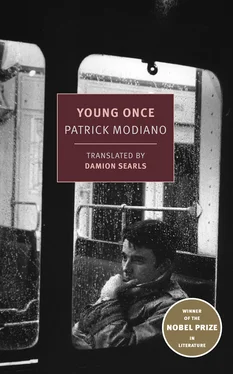•
But he did let himself ask Brossier some questions. They were sitting in one of the booths at the Rêve, a café on rue Caulaincourt that Louis liked for its name: Café Dream. It amused him and Odile to say, “See you at the Dream at five.”
“You don’t trust Roland, do you?”
“No, it’s not that…”
“Roland is a good guy, old boy. Not everyone gets the Médaille militaire at twenty-three.”
“I know.”
“You’re doing very ordinary work. It’s boring. I don’t mean that as an insult. It’s a job like a messenger’s, or a bellhop’s. There’s nothing suspicious about that, is there?”
He gave him a friendly clap on the shoulder.
“I’m joking. You’re more like Roland’s secretary. Me too, for that matter. You think that’s anything to be ashamed of?”
“No, but what exactly does Roland do?”
“Roland is a businessman, with an interest in cars, and other things,” Brossier answered carefully, as though reciting a lesson.
“How did you meet him?”
“I’ll tell you someday when we have more time.”
They had left and were walking down the street. A crowd of children bursting out of the school yard jostled them. One of them was wearing roller skates and the others were chasing him.
“You’re nervous, I understand,” Brossier said in his husky voice, a little breathless, the voice he used to talk about matters close to his heart.
This was not the blustering Brossier anymore. How strange, Louis thought — that a person can have two different voices like that.
He was saying that at Louis’s age, one often has rather vague and boring tasks to perform; you have to make do however you can. Things get clearer later, but when you’re twenty they’re still in a rough and sketchy state. Everything is hazy. That’s life in the beginning, old boy. I myself… One day, I’ll tell you everything.
•
She tried to keep busy while Louis was out. She had kept a friend named Mary from her time at the cabaret-restaurant in Auteuil; Mary still worked there. She sang and danced for a few minutes, accompanied by a group of balalaika players and dressed in a “Ukrainian princess” costume, which looked more like an outfit from the Tyrolean Alps. But the folklore act was nothing more than a temporary way to earn some money. Her dream was to open a little fashion boutique. She discussed it with Odile and they made plans to go into business together.
In the meantime, Mary could work at home and build up a clientele. Odile wondered how they could pull together enough money to open the shop. They had already decided on its name, Chez Mary Bakradzé, thinking the strange name would work in their favor. Under “Chez Mary Bakradzé,” in capital letters, it would say “MODE — FASHION,” a label Odile had admired on the pediment of a store in the Saint-Honoré neighborhood.
Mary drew the patterns and knew how to cut the fabric. She had worked for a dressmaker, a friend of the family, when she was very young. Odile asked her about her parents but never got a straight answer: Sometimes Mary said her father and mother were separated and living abroad; sometimes they were living in a house in the south of France and would be coming to visit her any day now; sometimes they had disappeared. The one fixed point in the fog — the only member of the family who had left any visible trace — was Mary’s grandfather, a writer exiled to Paris, one Paul Bakradzé. He devoted his talents to portraying, in delicate brushstrokes, life in a military garrison in southern Russia. One of his novels had even been translated into French, and Mary piously kept a worn old copy of it.
She was blond, petite, with very fair, almost pink skin and pale blue eyes.
Odile and Louis saw her on Sundays. Mary lived in the area between avenue de la Grande-Armée and avenue Foch, a hybrid zone where the sixteenth arrondissement becomes solid and residential but the streets are still under the sway of the garages, stores selling bicycles or ball bearings, old dance halls, and the ghost of the old Luna Park.
The three of them would stroll in the Bois de Boulogne, from Porte Dauphine to the lakes. There, they would take a rowboat and paddle for an hour. Or else they would moor at the dock of the Chalet des Îles and play a game of miniature golf. When it got dark, they would go back to Mary’s apartment: three rooms, with the first two serving as anteroom and living room. The third, at the end of a long hall, was Mary’s bedroom.
When they arrived, ten or so people would be crowded into the living room. Older people, some of them quite elderly, playing bridge or chatting over tea. Mary hugged a woman of about sixty as she walked past — tall, moon-faced, with slanting eyes and the authority of mistress of the house. Her aunt, Mary told Louis and Odile.
The gathering talked or played cards in the dimly lit room. Every time, Mary would light the lamps and the chandelier, as though this task had been left to her because the others thought it was too hard to flip a switch, or beneath their dignity. Or maybe the idea never crossed their minds.
In Mary’s room, they listened to records and talked. Odile and Louis had found in her the carefree laziness that was actually natural to them both. They were all the same age, born the same year. They understood one another, and Odile and Louis often stayed the night.
Mary would bring them something to eat, a piece of cake or a bowl of soup. They would hear the murmur of voices in the living room through the half-open door. Little by little, the conversations would die out, the people would leave. A man would be talking on the phone in the hall. He would be quiet for long stretches, and they would think he had hung up every time, but then he would say something else, before falling silent again. This conventicle in an unknown language on the phone would go on for hours, often until morning.
•
One Sunday, one of Mary’s friends came by, a young Spaniard their age named Jordan. He was looking for cabaret work with his drag-queen number. On Mary’s suggestion, he had introduced himself to the manager of the Auteuil nightclub and been hired for a trial period.
He would be starting there in a few days, and he wanted a stage dress like the one the heroine wore in an illustrated edition of Louÿs’s The Woman and the Puppet that he had found at one of the used-book stalls on the quais. Mary and Odile decided to make him one, and spent days cutting and stitching in Mary’s room while Louis read a mystery novel. At each fitting, Jordan asked Louis for his opinion. The dress looked good on him, and with his soft features, under his mantilla, the illusion was very convincing.
The evening of his debut, Louis and Odile went to the nightclub. Jordan was on after Mary. The balalaikas fell silent and, in the darkness, a deep voice announced: “La Cigarrera!”
The first notes of Hummel’s Bolero sounded, which Jordan was going to dance to; he had brought the tape himself. When the lights came on, Jordan was standing in the middle of the stage, pale and paralyzed in his dress.
The castanets fell from his hand like dead fruit. He stood there unmoving for several seconds, then collapsed on the floor. He had fainted from stage fright — or hunger, since he had eaten almost nothing for two weeks, afraid of losing his “figure” and not being able to fit into his dress for the act.
He was fired on the spot, and Odile, Louis, and Mary had to console him.
ON THE first day of spring, Bejardy invited Odile and Louis out to lunch, and the two of them decided to take advantage of the sun by walking the whole way to Quai Louis-Blériot.
Brossier opened the door and brought them into the living room, where a table had been set for five. Bejardy was with a young brunette, the one whose photograph Louis had noticed on the mantelpiece the first day.
Читать дальше












